I recently had this problem of constantly being hunched over when working on my lathe. This can be a major pain in the neck, not to mention bad for your posture. A good way to combat this is to adjust the height of your workbench accordingly.
I have discovered, through trial and error, what the ideal height for your lathe workbench should be.
In general, a lathe workbench should be at a height where your elbows are at a 90-degree angle when standing in front of it meaning your forearm should be parallel with the floor. This will allow you to work on your lathe without having to hunch over constantly. However, on average, a 36″ (914mm) bench height works well for most people.
In this blog post, I will discuss the ideal height for your lathe workbench. I will discuss the different factors you need to consider when choosing the right height for your workbench and provide some tips on adjusting it if it’s not quite perfect.
With 20 years of experience in woodworking, I compiled The 10 Best Woods To Make A Workbench! Be sure to check it out!
How To Find The Right Height Workbench?
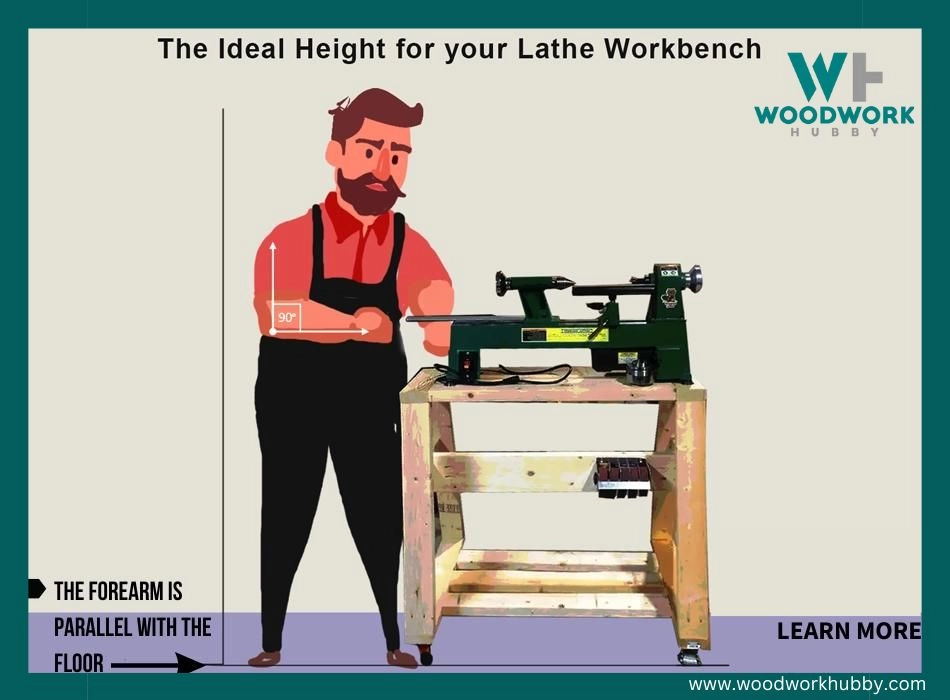
It would help if you considered a few different factors when finding the right height for your lathe workbench. The first factor you need to consider is your height and preferences. If you’re tall, you may want to position the lathe higher so you don’t have to stoop over too much.
Conversely, if you’re shorter, you may want to position the lathe lower to reach the workpiece more easily. The last thing you want is to be hunched over your workbench or reach up too high to use your lathe.
Other factors include:
The Type of Wood You’re Working With
The type of wood you’re working with is also an important factor to consider. If you’re working with a large piece of wood, you may need to adjust the workbench’s height accordingly. Conversely, you may need to adjust if you’re working with a small piece of wood.
Are you looking for a new hobby and have the question, “Is woodworking expensive?” I Will Show All The Costs here! Click on my article to learn more.
Type of Work
If you’re doing a lot of turning, you’ll want a higher bench to work with your arms in a more natural position. However, if you’re only using your lathe for occasional sanding or light work, then a lower bench will be just fine.
Type of Lathe
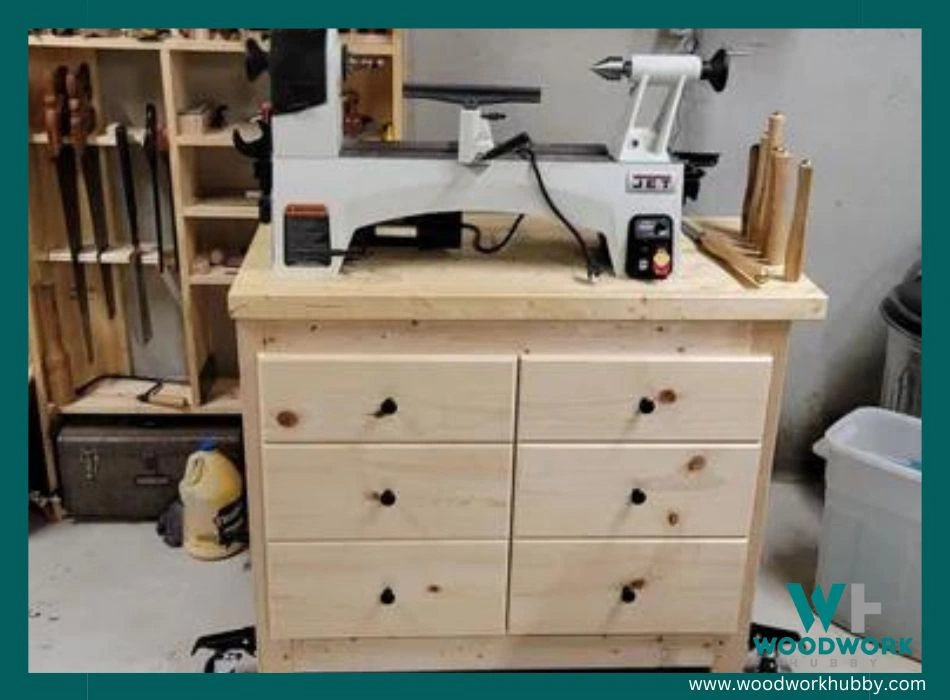
Finally, you need to think about the type of lathe you have. Some lathes are designed to be used with a higher workbench, while others can be used with a lower one. If you’re unsure of what height your lathe should be, consult the owner’s manual or ask a professional at your local woodworking store.
Below is a table showing the recommended lathe workbench for different heights.
| Workbench | Height (Inches) | Height (millimeter) |
|---|---|---|
| Low workbench | 29-30 | 1.14-1.18 |
| Tall workbench | 37-39 | 1.46-1.54 |
| Average | 34-36 | 1.34-1.42 |
How Tall Should a Wood Lathe Be?
The lathe’s height should be positioned so that the spindles are at or slightly below elbow height. The best height for your wood lathe is where you can handle the tools and feel most at ease while turning. You should be able to reach the workpiece without having to hunch over too much.
Why Wood Lathe Height is Important
Comfort is a very important reason why the height of your wood lathe is important. If you’re constantly hunched over your workbench, it can lead to neck and back pain. Not to mention, it’s not good for your posture.
By adjusting the height of your workbench, you can avoid these problems and stay comfortable while working on your lathe.
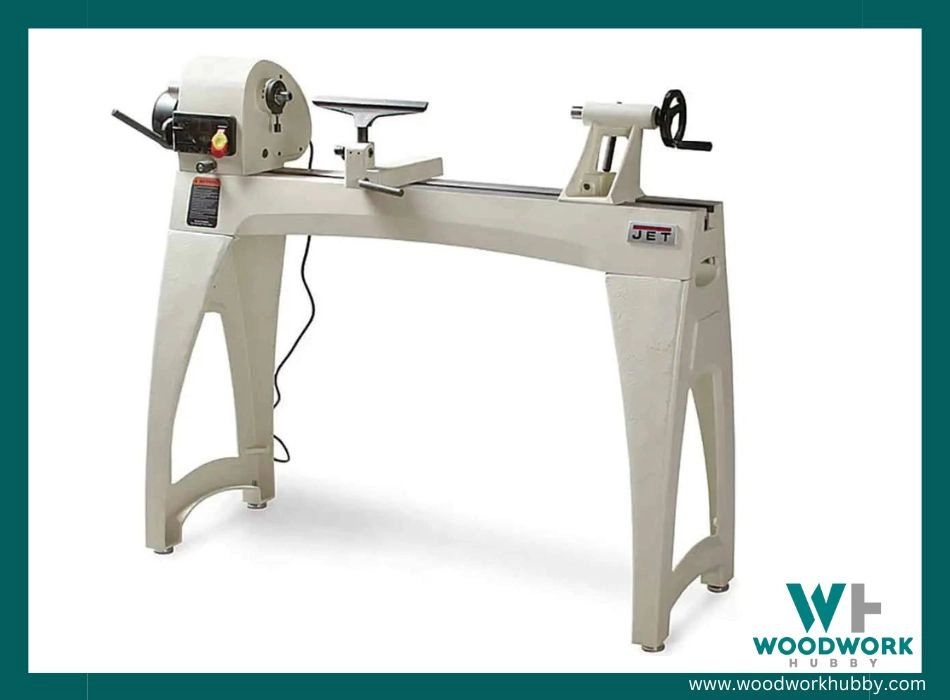
Other reasons include:
Getting the Right Angle
As a woodturner, you know that the angle of your tool is very important. If the lathe is too high or too low, it can be difficult to get the right angle on your workpiece. This can lead to poor results and wasted time and effort.
Avoiding Lathe Kickback
A lathe kickback is when your tool catches on the workpiece and causes it to spin rapidly. This can be dangerous and damage your workpiece. By having the right height for your lathe, you can help prevent this from happening.
Working Relaxed
You need to set your lathe at the right height to work comfortably. If your arms are constantly strained, it can lead to fatigue and affect your concentration. This can make woodturning more difficult and less enjoyable.
How High Should Spindles Be?
The spindles should be at or slightly below elbow height when working with a lathe. This will allow you to reach the workpiece easily and avoid having to hunch over your workbench.
The video shows setting up for spindle turning
The spindles should also be positioned so that they’re easy to reach. If they’re too close to the edge of the workbench, it can be difficult to use them properly. Conversely, you may have to stretch to reach them if they’re too far from the edge.
How Tall Should a Wood Lathe Stand Be?
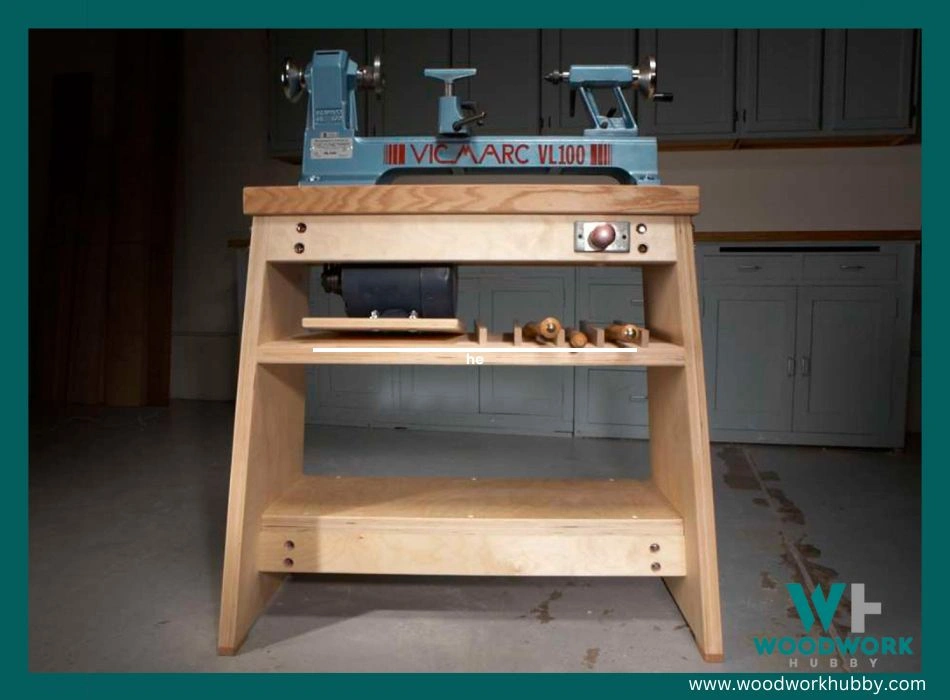
The wood lathe stand should be set at a comfortable working height. You don’t want it to be too high or too low. A good rule of thumb is to set the lathe stand at a height where the center square is about the same elevation as your elbow.
How Do You Build a Lathe Stand?
There are many different ways to build a lathe stand. When building a lathe stand, you need to ensure that it’s sturdy and well-built. This is important because the lathe stand needs to support the weight of the lathe and the workpiece. It also needs to be level so that the lathe doesn’t wobble when in use.
The video shows an easy 2×6 wood lathe stand.
Read on for a step-by-step guide on how to build a lathe stand.
Step One: Make a Top
To do this, you need to cut nine 3-foot long two-by sixes. After they are ready, glue them together to make a solid top. It should be about 33 inches wide.
Step Two: Make the Legs
Now you need to make the legs for the Lathe stand. Cut four, 24-inch long two-by-fours. These will be the front and back legs. Then, cut two 30-inch-long two-by-fours. These will be the side legs.
Step Three: Assemble the Lathe Stand
Now it’s time to assemble the Lathe stand. First, attach the front and back legs to the top. Use screws or nails to secure them in place. Then, do the same with the side legs.
Step Four: Attach Lathe Feet
If your Lathe has feet, you need to attach them now. Lathe feet help to keep the Lathe stable when in use. To attach the Lathe’s feet, screw them into the bottom of the Lathe stand legs.
Step Five: Add a Shelf (Optional)
If you want, you can add a shelf to the Lathe stand. This can be useful for storing Lathe tools or other items. To add a shelf, screw or nail a piece of wood to the Lathe stand legs.
How Do You Increase the Height of a Lathe?
You can increase the height of your lathe by adding lathe feet. These are screw-on feet that raise the Lathe off the ground. This can be helpful if you need to use your Lathe on a higher surface, such as a table or countertop.
To add lathe feet, screw them into the bottom of the lathe’s legs. You can find lathe feet at most hardware stores.
Other methods are as follows:
Add Risers
Risers are blocks of wood that you can screw or nail to the lathe’s legs. This will raise the lathe off the ground.
Use a Lathe Stand
If you have a lathe stand, you can set the lathe on top of it. This will raise the lathe to a comfortable working height.
You can also build a new lathe stand taller than your old one. This is probably the most difficult option, but it will allow you to have a lathe stand that is the perfect height.
Adjustable Legs
If your lathe comes with adjustable legs, use them to raise or lower the lathe until it’s at the perfect height. The adjustable legs are usually located at the bottom of the lathe’s legs.
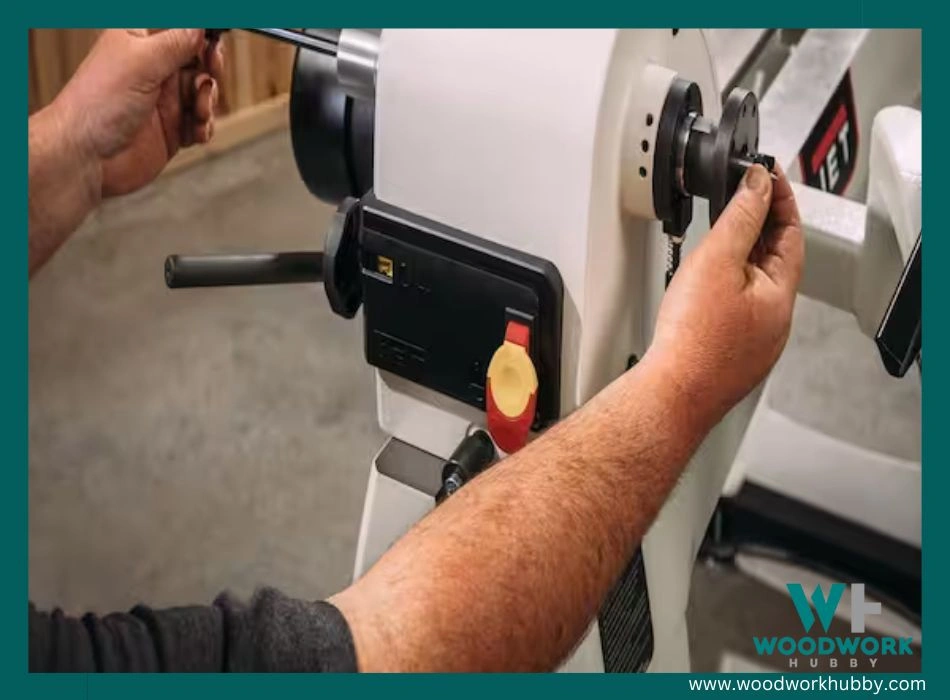
What Are the Benefits of Buying an Adjustable Lathe Stand?
As the name suggests, an adjustable lathe stand can be adjusted to different heights. This is helpful because it allows you to set the lathe at a comfortable working height. It also means that you can use the lathe on different surfaces, such as a table or countertop.
An adjustable lathe stand is also helpful if you share your lathe with other people. This is because you can simply adjust the lathe stand to accommodate different users.
Another benefit of an adjustable lathe stand is that it’s easier to move around. This is because the lathe stand can be folded up when not in use.
An adjustable wood stand also gives you versatility. You will find that many wood lathe stands come with different attachments. These attachments can be used to change the function of the lathe stand. For example, some lathe stands come with a router table attachment. This allows you to use your lathe as a router table.
Final Thoughts On Lathe Workbench Height
The ideal height of a lathe workbench is a matter of opinion. You may feel comfortable working at a higher or lower level than someone else. It’s important to find the lathe height that works best for you.
Generally, a lathe workbench that is 36 inches high is a good middle-of-the-road option. I hope this article has helped you to find the perfect lathe workbench height for your needs.




